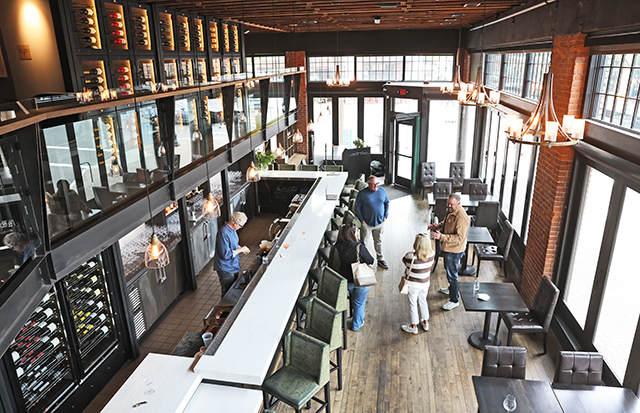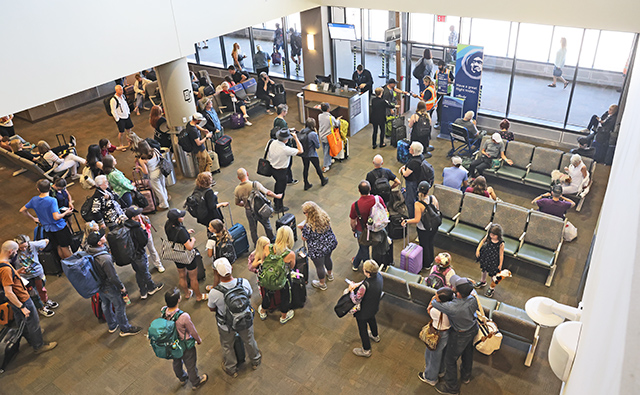Formerly homeless, Kristina Neet now helps others get off the streets
Published 12:00 am Sunday, September 1, 2019

- Kristina Neet, left, and Richard Valet cut the cake after their symbolic wedding ceremony in July at the Cascade Peer and Self-Help Center in Bend, where Neet is a manager.(Submitted photo)
After facing homelessness and addiction herself, Kristina Neet now helps others get off the street.
Neet is manager of the Cascade Peer and Self-Help Center, a nonprofit drop-in space offering peer support and a safe space to anyone in treatment with Deschutes County Behavioral Services, its primary source of funding along with donations. There, someone can stop in and eat lunch, watch TV, do laundry or take a shower.
It is not Neet’s first time helping the homeless and addicted. She did similar work over 10 years ago in San Francisco soon after the Christian-raised Neet attended a six-month discipleship training there.
“I had no clue back then what it was like to be homeless,” said Neet, now 32. “I never thought I’d be on the other side of things.”
She had a well-off childhood in the Westminster area of Southern California.
“I never thought I’d be on the street like that,” she said.
Neet attended boarding school, starting at age 16. She was still attending two years later when her family moved to Bend. She eventually followed, after her stretch in San Francisco.
“I was close to my family,” Neet said last month over a cup of coffee. “I grew up in a good family, a strong Christian home.”
Addiction enters
While she couldn’t relate to the homeless as a peer, she was familiar with addiction. At 12, she had begun taking pain medication, she said, “and that’s kind of where my struggles started. I had some back problems, which is the original reason I took it.”
She continued to take pain meds off and on for years.
“I’d do good for a while, and then I would crash and burn. My cycle for a long time was do really well … a month, a year, and then I’d fall back into it.”
Neet is a mother of three. She had her first son, who turns 11 this month, at 21. Her youngest is 4 years old. Neet later got married to a different man than her first child’s father. They had two children together.
“We were married for almost five years, and we both struggled with addiction,” Neet said. Shortly before becoming pregnant with her third child, Neet said, she was sexually assaulted by an acquaintance.
“I spiraled down. I fell apart. I didn’t get help,” she said. “I started drinking.”
Her youngest son was born two months too early, and while he was in the Neonatal Intensive Care Unit, she and her husband were involved in a car accident.
She has trouble recalling some of the timeline of events at that time, but not the results or emotional impact. The car accident led her to begin drinking more heavily, and using painkillers, she said.
“We ended up losing our kids due to addiction,” Neet said. Her oldest went to live with his biological father, while her parents adopted her two younger children.
Neet and her husband would soon split up.
“I had to leave my ex-husband because he just got really verbally abusive, and we also couldn’t get clean together,” she said, adding that she got a restraining order against him.
“I tried to get back on track, but I didn’t get on track in time before the judge decided my parents (would be) adopting my two kids,” she said. “So I was alone.”
Neet bounced around with friends for a while, eventually landing in a tent, learning 10 years or so after her time in the Tenderloin area of San Francisco what life on the other side of safe housing was like.
“I was at the bottom. I mean I lost all hope. I wanted to die,” she said. She camped with a man who had schizophrenia. He was not taking medication.
“It was not a great situation, but I didn’t have anybody or anywhere to go anymore,” she said.
“Thank God I actually had him, because he did protect me as far as being out there alone. He was a bit verbally abusive to me as well. I didn’t really feel like I deserved any better at that point, either.”
Reaching for a lifeline
Even while camping, Neet still managed to attend church. A woman from her church would pick her up at her campsite and bring her to the service. Eventually she gave Neet a lifeline, the phone number of local homeless advocate and volunteer Larry Kogovsek.
“(She) gave me his phone number and said, ‘You should call him. He can help you,’” recalled Neet.
Before she reached out to him, Kogovsek, who is board president of the Cascade Peer and Self-Help Center, called and left her a voicemail — she still had a phone at that point.
“I was at the point where I was just ready to die out there. I thought I was going to die in that tent. That was it,” she said.
Though the two had never met, Kogovsek’s message said to call anytime, day or night, and he’d be there for her.
“I eventually called him, just crying, and he met me at the hospital and we talked,” Neet said.
Kogovsek firmly believes in an approach to helping the homeless called “housing first” — a stable living situation being the critical first step toward cleaning up and finding employment. He helped her get into Bethlehem Inn, a local homeless shelter, but, Neet said, she wasn’t quite ready, and ended up back outside. She got a chance to go to another Bend shelter, Shepherd’s House.
“I screwed that up too,” she said.
Although a stable living situation would take more time, Neet found out about the Cascade Peer and Self-Help Center located at 1128 NW Harriman St. in downtown Bend.
“I started going there, and I got a lot of support,” Neet said. One acquaintanceship she made at the center led to a room in a house, where she lived for two and a half years.
She was getting treatment at Deschutes County Behavioral Health and meeting more people who stuck by her side, including, in December 2016, Richard Valet, with whom she’s now in a relationship. Despite the growing positives in her life, Neet hadn’t stopped using drugs and alcohol, and on Mother’s Day 2017, she attempted suicide after a binge.
“Basically, I was coming down from using and drinking,” she said. “Had I not been on drugs, I probably would not have tried to kill myself.”
Despite the scare, “Richard stayed. He didn’t leave,” she said, crying.
Neet calls surviving the suicide attempt her “big wake-up call.”
“I woke up happy to still be alive, and happy that he was still there,” she said.
The day after her release from the hospital, she heard from Deschutes County Behavioral Health, and she soon had a new psychiatrist and an “amazing” new counselor. Together, they came up with a safety plan for Neet that allowed her to head home instead of into in-patient treatment.
“I finally decided I was going to start doing the work to get better,” Neet said. She entered Deschutes County’s drug and alcohol treatment program, and Richard moved in with her and her roommate.
“He’s the one who helped me get back on my feet,” she said. “He helped me get clean and stay clean.”
She graduated from the drug and alcohol program and continued going to classes there. All through that time, she attended the Peer Center, where she served 100 hours of community service.
After completing her 100 hours, the center hired her as an employee on an on-call basis. Before long, she was promoted to manager.
It’s obvious when you talk to Neet that she’s a big believer in the center and peer support.
“All of our staff have shared, lived experiences with dealing with mental illness and addiction,” she said. “And all of us are stable in our recovery.”
Moving toward reconciliation
Today, Neet and Valet live in Sisters with their two puppies. On July 19, the two exchanged vows. Fittingly, Kogovsek performed the ceremony, although he stresses that he is not ordained and the ceremony was symbolic.
“We’re just a bunch of hippies,” he said. “It was entirely symbolic. I had been working with Kristina for a long time, and I know Richard … very well, and they just have a lot of respect for me and thought it would be special that I do that.”
Neet beamed as she talked about the ceremony.
“We got married at the Peer Center, had all of our friends (there),” she said. “We planned it in two days, and Larry actually married us. He’s watched me go from my lowest point to now being the manager of the Peer Center. … He’s been there for me the whole time, and what better person to marry us?”
As if her relationship and her work weren’t enough, Neet has one more incentive to stay the path. She hasn’t talked to her parents in nearly four years, she said, but in November she’ll hit the two-year sober mark, at which point there’s a plan to reconcile with her parents and kids.
“It is a choice, to an extent. It was a choice to get sober and to start living my life again and rebuilding,” she said. “And so I do believe there will be reconciliation with my family. It’s just going to take time. … I’ve come to realize, obviously, how bad that I’ve hurt them. I caused them a lot of pain.”
Neet said she used to be angry and bitter about the emotional and physical abuse she endured, “but what I didn’t know was that God was going to use me to be able to relate and empathize with others who have experienced what it feels like to be at rock bottom and have no hope. I want people to know that there is still hope, even at rock bottom.”
Her advice to others trying to get their lives back under control is to reach out to others.
“That first step is trying to build a support system,” Neet said. “For me, the biggest thing is my support system. When I’m feeling down, when I’m feeling hopeless, I reach out. That’s my first line of defense.”
— Reporter: 541-383-0349, djasper@bendbulletin.com






